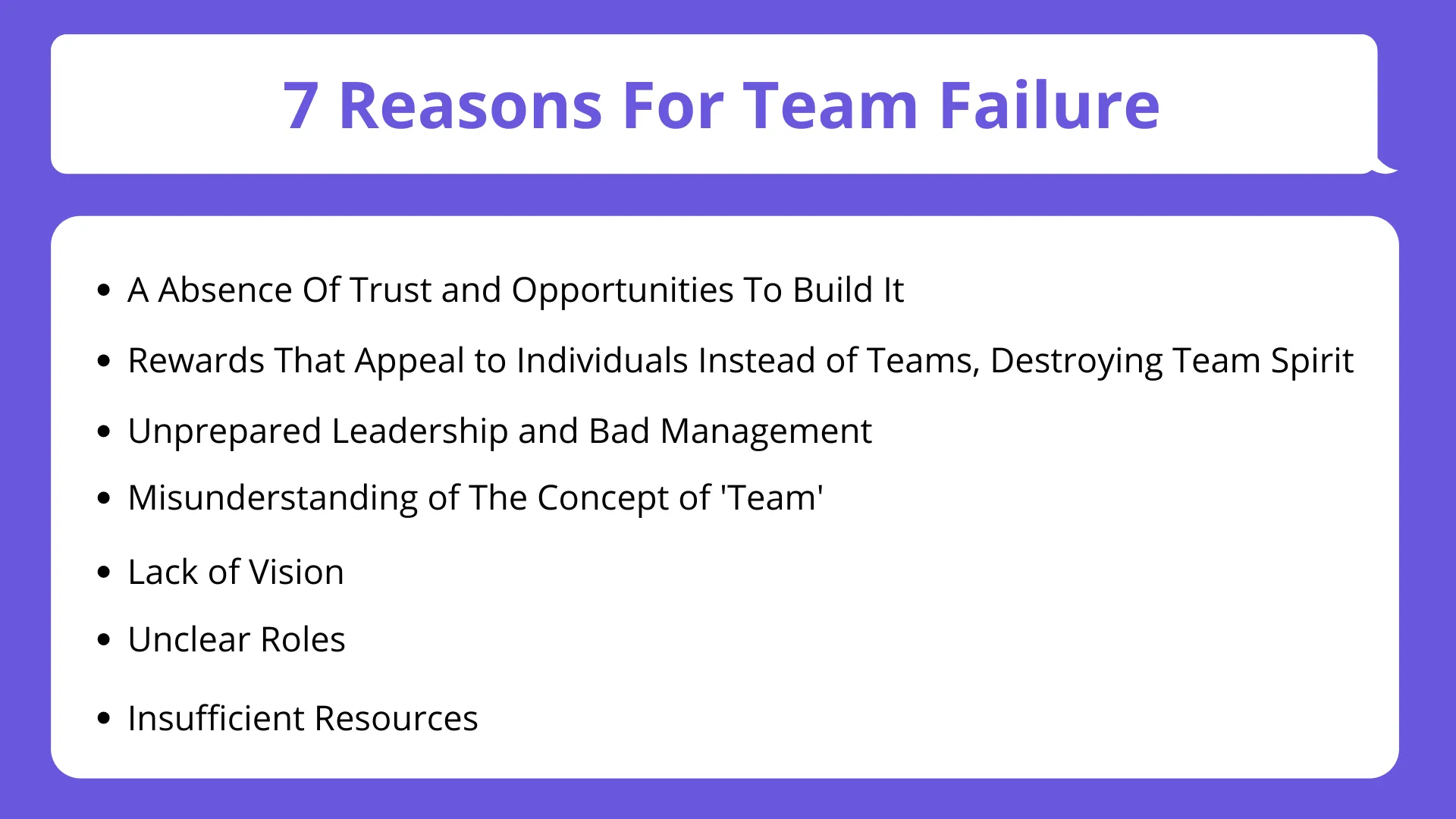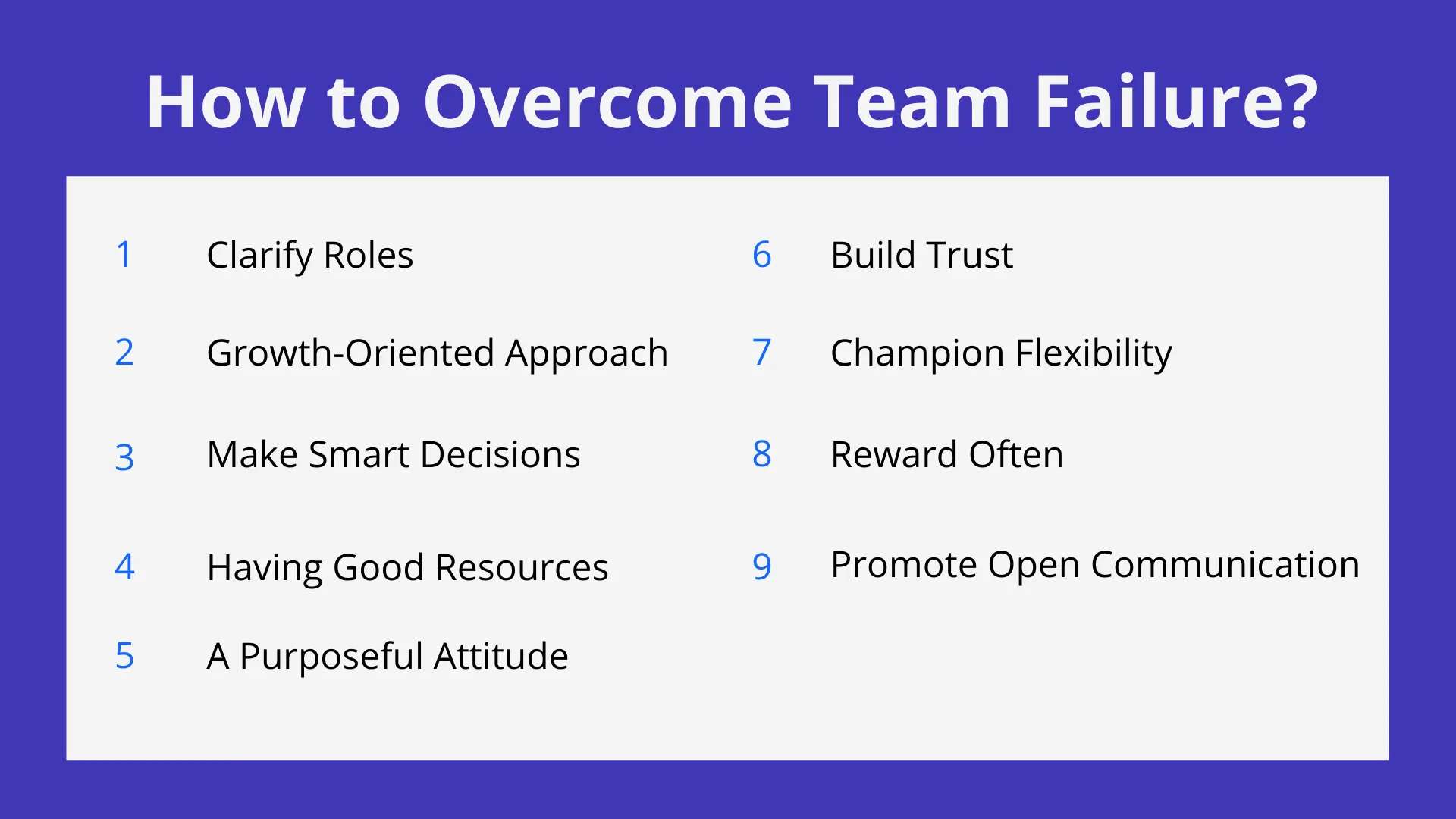7 Reasons Why Teams Fail and How to Overcome It
7 Reasons Why Teams Fail and How to Overcome It
Despite the best intentions of the organization and the best efforts of its members, teams still fail. There are many reasons for team failure which impact so many businesses because it’s a complex issue.
This is why it is essential to analyze and comprehend these reasons. Team failure affects the morale of the employees and the organization’s financial condition. The organization needs to eliminate as many reasons as possible to ensure team success.
This blog will look at seven reasons for team failure and how to overcome them to build a successful team.
7 Reasons For Team Failure
Team Failure can happen because of:
1. A Absence of Trust and Opportunities to Build It
2. Rewards That Appeal to Individuals Instead of Teams, Destroying Team Spirit
3. Unprepared Leadership and Bad Management
4. Misunderstanding of The Concept of ‘Team.’
5. Lack of Vision
6. Unclear Roles
7. Insufficient Resources

1. A Absence of Trust and Opportunities to Build It
Trust is one of the most important elements of cohesion. Each team member should feel confident that they can rely on other team members to do their jobs well and with motivation to do so.
But trust is often lacking, preventing team members from investing themselves fully. In most cases, this is the result of a lack of trust-building activities in the first place.
2. Rewards That Appeal to Individuals Instead of Teams, Destroying Team Spirit
Individual incentives that enhance a person’s status above and beyond their peers may cause teams to splinter.
Individuals shouldn’t be rewarded in a way that undermines the team spirit. The prize should instead be everyone’s progress.
3. Unprepared Leadership and Bad Management
It is no secret that incompetent managers cause their employees a lot of stress – even to the point of affecting their health – and have a variety of destructive characteristics, such as poor communication skills and limited self-awareness.
In addition to adding stress to the workplace, bad managers often create teams that fail to meet goals and easily fall apart.
This is a cautionary tale about the importance of good leadership, especially when teamwork has become a top priority for an organization.
4. Misunderstanding of The Concept of ‘Team’
The success or failure of a team can be determined by how leaders define ‘teams’ in the first place.
The difference between teams and workgroups is that a team is a specialized group of people united around a common goal. In contrast, a workgroup may come together to tackle a basic task or contribute some ideas.
Managers often confuse teams with groups, and vice versa, without understanding the fundamental differences between the two.
As a result, teams often lack a sense of direction. Managers should understand the meaning of teams, and as a result, develop an overarching purpose for their teams.
5. Lack of Vision
According to Tony Robbins, Without a clear and well-communicated vision, an organization will never align itself for success.
When people don’t know why they are working together, they sway in different directions, which leads to everyone making different assumptions.
6. Unclear Roles
The worst feeling is not knowing exactly what you need to do. It can be difficult to decide what to do next when roles are unclear.
When this happens, team members prioritize some of the very primary tasks that they believe will make them feel efficient, only to realize that they have been wasting time.
Without clearly defining the roles and responsibilities of each team member, they may take on a task that doesn’t match their experience and expertise, causing team failure.
7. Insufficient Resources:
One of the major reasons for the team’s failure is a lack of appropriate resources. It is sometimes the team’s fault, but most of the time, it is the organization’s fault that chartered the team in the first place.
If the right tools, authority, and equipment aren’t available, the team’s morale will fall, and their commitment will wane as a result.
How to Overcome Team Failure?
1. Clarify Roles
2. Growth-Oriented Approach
3. Make Smart Decisions
4. Having Good Resources
5. A Purposeful Attitude
6. Build Trust
7. Champion Flexibility
8. Reward Often
9. Promote Open Communication

1. Clarify Roles
An effective team knows what should be done and conducts regular discussions about responsibilities.
Their goal is to ensure no gaps in understanding between team members. There are scorecards with key responsibilities, key performance indicators, and performance targets.
Afterward, they merge their scorecards to create a matrix of roles that ensures no holes or duplicates and that handoffs are perfectly coordinated.
2. Growth-Oriented Approach
When a team is growth-minded, it never fails. Often, these teams are willing to take risks and will try things that at first appear impossible.
As a result, they learn more quickly, discover new information and approaches, and develop new skills and techniques along the way.
3. Make Smart Decisions
Those teams that avoid failure understand the stages of decision-making – input, consult, make, approve, and inform – and have identified who is involved at each stage. They also invest in employee management tools for better management and increased efficiency.
When people have been included in the right way in their implementation process, it will be easier for them to move quickly.
4. Having Good Resources
To ensure your team never fails, make sure every resource at their disposal is available to them, so they can work rapidly and with purpose.
In addition, experienced managers know that they need to remove roadblocks and provide the team with the right resources and information. Team members should make day-to-day decisions.
5. A Purposeful Attitude
As a team leader, you need to ensure that your team has a compelling vision, a clear set of goals, and a shared set of values.
Employees should look forward to coming to work each day and feel that they can share their thoughts, opinions, and feelings openly as a member of the team.
This is the only way to define their common goal and move forward toward it.
6. Build Trust
Every successful team relies on trust. When team members do not trust one another, they will have difficulty collaborating.
To build trust as a manager, you must show your team members that you trust them.
7. Champion Flexibility
Researchers have shown that flexible work schedules are more productive and happier. Allow your staff to work the hours that are convenient for them.
Some team members might work best in the morning hours. Others will appreciate the job more if they can take a break to care for their children during the day.
For implementing a flexible work schedule, you can develop a policy that sets out clear guidelines to let employees know what kind of behavior is acceptable.
Are you expecting them to be available at certain times of the day or to respond within 24 hours? You should include that in your policy.
It’s a good idea to take things slowly when experimenting with a flexible schedule at first.
Begin by implementing the schedule in one department first. If the company’s schedule goes well, consider rolling it out to the entire company.
You must monitor how the new schedule affects team members to adapt accordingly. Pay attention to signs of more satisfaction, better productivity, and increased engagement.
8. Reward Often
If you want employees to feel appreciated, praise them generously. In this way, team members will feel motivated and encouraged to do their best.
Along with praising team members for their hard work, you can reward them with gift cards, more time off, and anything else that comes to mind.
By creating an employee recognition program, you will benefit from rewarding your team.
You are more likely to be consistent in your rewards by doing this. Additionally, it will provide employees with something to look forward to every month.
9. Promote Open Communication
Poor communication is a common cause of team failure. Communication problems will lead to misunderstandings and inefficient processes if your team cannot communicate effectively.
To improve team communication, transparency is the most critical factor. Information about the project and the team should be accessible to everyone at all times.
They should also feel comfortable sharing ideas and offering advice on improving workflows and processes.
In addition to making team members’ jobs easier, transparent communication helps them see the big picture and be more efficient.
You can record meetings to make your team’s communication more transparent. Do you ever have a meeting where one or more people are missing?
Whenever possible, record meetings or write notes to review and stay up to date so that people who weren’t there.
Discuss important topics in public channels rather than in private email chains. Use Slack or something similar to allow the entire team to contribute and follow along on important topics.
Organize all your project and team information in one location. Use tools like Notion or Almanac to make it easier for your team to access information about your company, product, or project.
Conclusion
An organization can achieve incredible results when its teams are effective. Team members will not fail if you pay attention to each individual’s goals and manage their collective efforts!
Being a good manager will give your team the best chance for success. You can also encourage your employees to enroll in training courses and give them praise often.
Make sure all members of the team are self-disciplined and focused. Lastly, encourage open communication to establish trust and knowledge-sharing culture.

 in Melbourne
in Melbourne 
 Employee Screen Monitoring Software
Employee Screen Monitoring Software App and Website Monitoring Software
App and Website Monitoring Software Time and Attendance Software
Time and Attendance Software Finance
Finance Banking
Banking Healthcare
Healthcare Lawyers
Lawyers Retail & ecommerce
Retail & ecommerce Knowledge base
Knowledge base Blogs
Blogs Installation Guide
Installation Guide FAQs
FAQs About
About Media Kit
Media Kit Contact us
Contact us